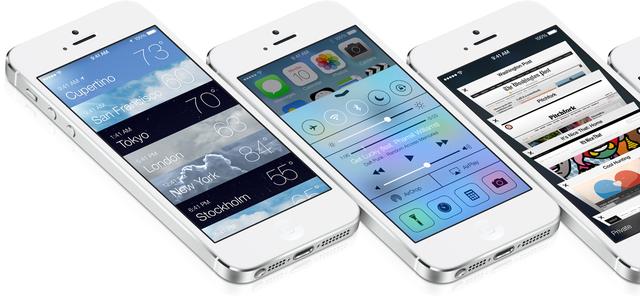
Since the next iPhone, believed to be called the iPhone 5S, is just around the corner (Apple has reportedly setup a September 10 2013 press event, and mass production of the 5S is rumored to have started), maybe it is time to gather the information that has been published in one place. Some data elements are supposedly leaks, while others are merely educated speculation but past Apple launches have showed us that iPhone-related rumors can be fairly accurate, although nothing is set and done before the actual launch. There is always a possibility for an iPhone 6, which could a bigger leap that what most people expect, however, given the evolutionary nature of consumer electronics and the lack of iPhone 6 indicators, an iPhone 5S seems more likely at this point.
iPhone 5S Release date
Since Apple’s event should take place on September 10, just days after Samsung unleashes the Galaxy Note 3 at IFA, we can say that the “launch” of the iPhone 5S will happen on that day. Now, the September 27 date is also floating around as financial analyst were speculating about the iPhone 5S and its implications for Apple’s earnings.
The other date that appears a lot is September 27, and it is possible that it is when the iPhone 5S will actually hit the stores and when the shipped pre-orders will arrive to the early customers. In past events, there was often a delay between the announcement of a device and the general availability date. There are number of reasons for this, logistical or administrative (last minute regulatory filings to avoid leaks), but the gap also has the side effect of allowing product reviews from “select press”, to be published ahead of the general product availability.
“When” it arrives also depends on which country you live in: it is common that Apple starts with the USA and a handful of others countries, before extending the reach of the product. To be fair, it is pretty “normal” since even Apple has only so many (human) resources to coordinate those launches. Additionally, different carriers and network may require some tweaks and tests. Apple is pretty good at limiting the number of variants it has built in the past, but the qualification process does take time.
If you live in China, there is a chance that your country may be high on the list this time. From what I have heard from insiders, China is increasingly becoming a “primary market” for Apple executives, and by that I mean that it is as
iPhone 5S Specifications
Since Apple doesn’t typically use 3rd party hardware such as a Qualcomm Snapdragon processor or NVIDA-equivalent, there is not much to hang on until the launch happens. In the past, Apple has done a good job with increasing the graphics capabilities of its “Axx” chips but doesn’t seem interested in entering any specifications war which would most likely led to an arms race, and that would be bad for the company’s gross margins. Still, some things are new, while others are simply important for the overall user experience:
Fingerprint sensor
On the hardware front, the fingerprint sensor is getting a lot of press lately. If true, the iPhone 5S would feature a (relatively) wide area fingerprint sensor that would not require the user to swipe at a certain speed in order to get a reading. Nearly all handset fingerprint sensors on the market require a swipe because it is cheaper to produce a 1D sensing array.
The downside of the 1D approach is that the speed of swiping and the actual finger pressure can greatly affect the quality of the reading. In practice, those sensors fail to interest users because they add too much “friction” in the user experience. Apple’s solution would take the swiping away, and since the user just presses a finger on a large sensor, the reading should be much more accurate, like taking a fingerprint photo.
"THE 2D FINGERPRINT SENSOR COULD MAKE UNLOCKING YOUR IPHONE MUCH EASIER AND NATURAL" If this works as planned, it could make unlocking your iPhone much easier and natural, and that would improve the user experience and the security at the same time. Typically, security adds friction, rather than remove it, so this would be an interesting switch. It was thought that the sensor would be embedded in the screen, but we are inclined to think that it will be embedded in a button instead, which makes more sense, since the sensor is a relatively thick element that shouldn’t be embedded in a “thin” component like the display.
The sensor is said to be convex, which means that it protrudes (outwards) from the iPhone 5S. As such, it would be much more exposed than the current “concave” (facing inwards) home button. That would be why Apple has reportedly chosen a Sapphire surface that would make it virtually impervious to scratches. Sapphire is the second-hardest mineral (after Diamond) and is commonly used in high-end watches for example.
Now, some industry insiders believe that this new piece of hardware could limit Apple’s ability to produce as many iPhone 5S as the market may want. People have been talking about a maximum of 4M units for the coming quarter, and while this is not impossible, I would be very surprised if Apple CEO Tim Cook would take that chance. After all, he is an “operations” person and would have seen this coming. Let’s wait and see.
NFC
It has been speculated that Apple may finally add NFC to the iPhone. Since NFC is present in nearly all new high-end Android handsets, we know that this is not a technological issue. It is possible that Apple was simply looking at how NFC would improve the user experience before including it – this is not a bad choice, and to be honest, I can’t say that NFC has changed my life, even if it made device pairing a lot easier.
Processor
It is suspected that Apple will launched the iPhone 5S with an A7 processor running at 1.5GHz (from 1.3GHz for the current A6). While specs are always dodgy at this time in the product life-cycle, many believe that it will have a quad-core configuration, and it should logically feature better CPU and GPU (graphics) performance. Leaks show marking with APL0698 (vs. the current APL5598 for the current A6X which is in the iPad 4), which is interpreted as being a new generation. Normally, it would be best to have an X-Ray die shot of the chip to see if the layout has changed or if there are additional cores, but nothing of that sort came up yet.
"MY IPHONE 5 HAS NOTICEABLY AGED, SO I AM LOOKING FORWARD TO A HARDWARE REFRESH" There’s nothing really out of this world to report since this upgrade cycle seems completely normal, and the speed bump would be welcome since the iPhone 5 has been behind in many benchmarks not long after it came out. Benchmarks are not THAT important, but when I pick up my iPhone 5, I can feel that it has reasonably aged, so I’m looking forward to a hardware refresh.
As of late, there were some rumors that Samsung would “make” the A7 for Apple. I would like to clarify this a little: Apple designs its own processors, sometime using logic blocks from others, but they put the whole thing together. Once this is done they go to a semiconductor company that will manufacture it for them in large quantities. So, the chip has been developed by Apple, but produced in mass by a 3rd party.
Also, there was some “evidence” from Nick Frey that Apple is using Samsung again for the A7 manufacturing. The presence of what seems to be a software driver would indicate that Apple may be using some Samsung technology, but it does not mean that Samsung will manufacture the chip for Apple.
Apple has also been said to be looking at TSMC to replace Samsung (and reportedly showed its intent with cash). TSMC is the world’s largest semiconductor contract manufacturing company and they are typically busy with the likes of Qualcomm, NVIDIA, AMD and other high-profile fab-less semiconductor companies. It is not unthinkable that TSMC could make room for Apple, but given the gigantic volumes that would be required, this is not something that would happen overnight. There is also work that needs to be done at the chip design level when switching to a different manufacturer. Right now, I think that the TSMC switch may happen later with the Apple A8 chip.
Finally, there has been some back and forth going on about the amount of RAM. Some think that 1GB will be again the quantity of choice, while others see 2GB as a more credible alternative. The latter seems believable given that software doesn’t tend to shrink over time. Also, many Android handset are starting to arrive with 3GB, so it’s completely doable from a technical standpoint.
iPhone 5S Display
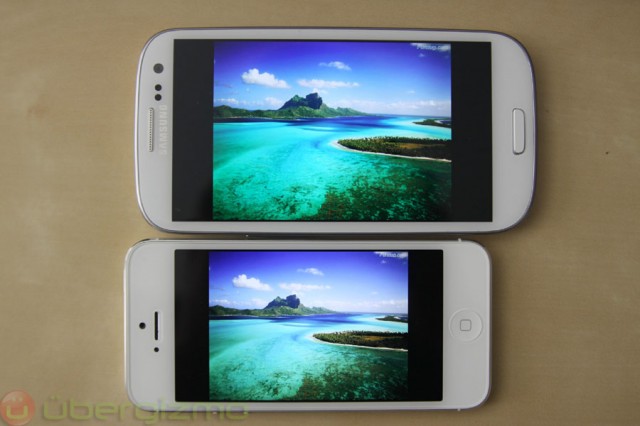
iPhone 5 Side by side with the Samsung Galaxy S3
While the idea of a larger screen has been hotly debated for a short time, the multiple hardware leaks suggest that Apple will stick to a 4” display size. The company is rumored to be doubling the display resolution, bringing the total number of pixels to 1.5M (from 730k with the current retina display). While the pixel density would be very impressive, one has to wonder about the actual benefit of doubling the resolution on a screen that is already relatively small.
Of course, there will be some perceptible sharpness on text and photos (if you have a good vision), but is bringing the pixel density closer to 600 PPI where resources should be spent? Wouldn’t a higher battery capacity or an optical camera stabilization be better options?
iOS 7
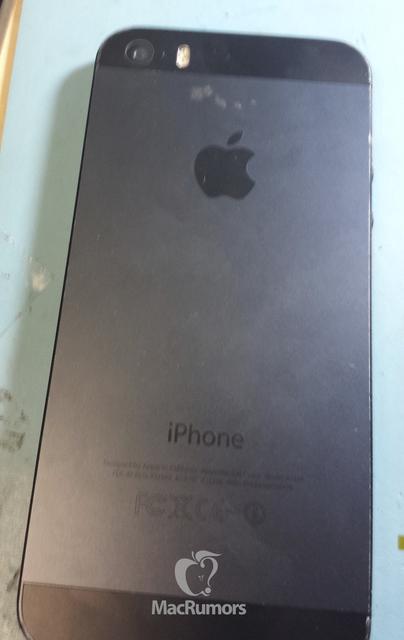
One of the few things that we know for sure is that the next iPhone will come pre-loaded with iOS 7. If you have followed the iOS reveal at WWDC launch, you may know that it will bring a fresh graphic design to Apple’s mobile OS. I really recommend reading our overview of iOS 7, but APIs aside, most of the visible changes are design-related.
Apple has also been working on iOS integration in automobiles. When it happens, iPhones will be able to pair with the cars in-dash screens, and you will be able to give voice commands via Siri. Honda, Mercedes, Nissan, Ferrari, Chevrolet, Infinity, KIA, Hyundai, Volvo, Acura, Opel and Jaguar are already in and should have compatible cars available in 2014.
Battery life
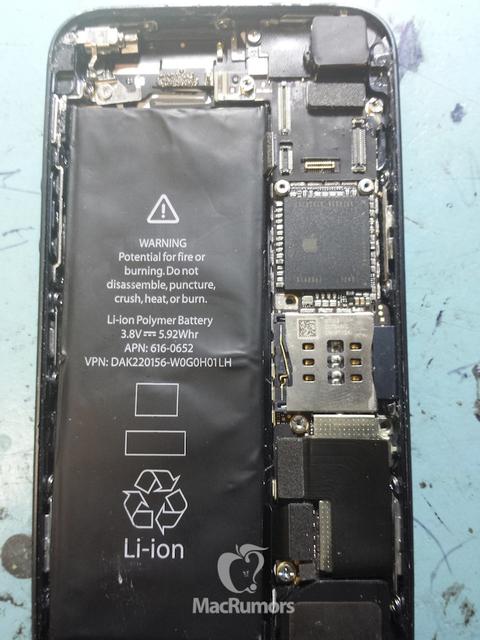
Since the form-factor of the iPhone 5S will remain roughly identical to the iPhone 5, there is not a lot of physical space for a battery capacity boost. From what has transpired online, the iPhone 5S will have about 8.6% of extra battery capacity (5.92Whr vs. 5.45Whr). How that would translate to actual battery life is unknown since we have to account for more screen pixels and a possibly high power processor consumption at peak performance. At the moment, it is probably fair to say that battery life should remain comparable to the iPhone 5.
There has been talk of a wireless charging capability, but unfortunately the rumors seem too thin to be credible. None of the battery leaks indicated that an induction mechanism was in place, but we can hope for the best on this one. It would be cool.
iPhone 5S Camera

At the moment, there is mounting indications (from Vietnam) that Apple is going to use a 12 Megapixel main camera (BSI sensor, f2.4 aperture) equipped with a dual-LED flash. The dual-LED feature first surfaced when the alleged upper-rear cover parts were first spotted on the Internet, featuring a slot that could accommodate more than the single LED that we’ve come to know. It also looks like the HDR photo processing has been offloaded to a secondary processors, instead of being done by the main CPU. We can’t verify this information, but we would take it with extreme caution.
The front camera is not expected to be making any splashes when it arrives. From what has surfaced on the web, it doesn’t look much different from the previous version.
iPhone 5S Design
The overall assessment of the situation is that the iPhone 5S will look very much like the iPhone 5. The fingerprint button mentioned earlier is going one of the prominent design change, but there may be something else:
According to a number of images and reports, Apple may be bringing a bit more colors to its iPhone line-up this time, including a “champagne” or “gold” iPhone 5S. Knowing that Apple’s new interest for the Chinese market, I can see why that particular tone may join the traditional black and white (“gold” color is super-popular there for other products). SIM Tray colors would indicate that this is plausible.
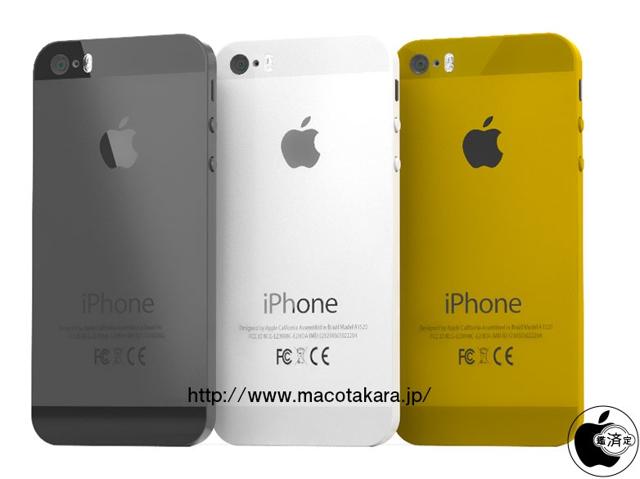
However, there’s more. If you believe the more extreme rumors on the matter, Apple would have even more colors in the works, and would do something as colorful as the iPod. Those rumors concern both the iPhone 5S and the more affordable iPhone 5C, but I wouldn’t be surprised if only the 5C was to get the additional colors, since it is likely to use a different/cheaper body and manufacturing process.
iPhone 5S Price
At the moment, there is no indication that Apple will deviate from its current iPhone pricing. When it is introduced, the iPhone 5S should cost anywhere from $199 (16GB) to $399 (64GB) – that is with a new contract of course. Out of contract phones are expected to be sold for $649, and unlocked phones should cost around $750. Those are the expected U.S prices.
Conclusion
It is that time of the year, and it is 100% certain that Apple is going to update its most profitable and successful line of product: iPhone. The iPhone 5S would be a welcome hardware refresh, but so far it looks like the design is not going to surprise us. Now the question is how much faster, and how much better the display is going to be. Of course, how does it translate into the user experience? We have seen enough of iOS 7 to conclude that it is refreshing, and we are looking forward to seeing it in action in cars. We can’t say that this is groundbreaking, but for now, a new iPhone remains an event in itself. What do you think?
Related: